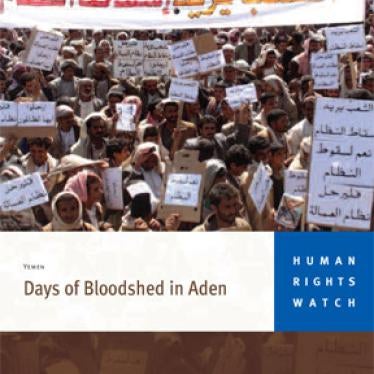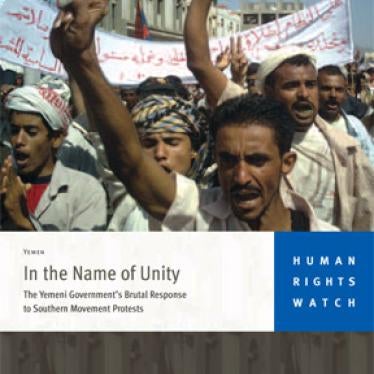(Aden) – Yemeni state security forces are threatening health care in Aden by forcibly removing wounded alleged militants from hospitals, exchanging fire with gunmen seeking to block the arrests, and beating medical staff. One hospital in that southern port city has suspended operations as a result.
Aden security forces describe the patients they have sought to arrest as suspects in serious crimes, including attacks against state security forces or armed robbery. Sources link most if not all of the wounded patients to Herak (“Southern Movement”), a coalition of groups seeking greater autonomy or independence for former South Yemen. Gunmen supporting and protecting the alleged militants have fueled the violence by firing at state security forces on hospital grounds.
“Gunfights in hospitals put patients and medical workers at grave risk and threaten to shut down health care in Aden,” said Letta Tayler, senior Yemen researcher at Human Rights Watch. “Both security forces and their opponents are showing callous indifference to human life.”
Government security forces have entered two hospitals in Aden at least five times in 2012 to arrest alleged militants, without warrants and despite warnings from doctors that the patients required continued hospitalization.
On October 7, 2012, state paramilitary forces allegedly beat hospital guards and shot a 16-year-old fruit vendor in the head during an exchange of gunfire with gunmen trying to block the arrest of two alleged militants being treated for gunshot wounds at Aden’s al-Naqib hospital.
“He had no gun. He was only selling fruit,” one of the teenager’s relatives told Human Rights Watch at the hospital two days later. “He was shot as he ducked to escape the bullets.” The international humanitarian organization Medecins sans Frontieres (MSF) indefinitely suspended operations at its Aden hospital after a similar gunfight on September 27.
The Central Security Forces (CSF), a state paramilitary unit, has played a prominent role in the hospital raids, which took place at al-Naqib and the MSF hospital. CSF is commanded by Yahya Saleh, the nephew of former president Ali Abdullah Saleh, who left office in February after a yearlong uprising. In the October 7 incident at al-Naqib, the CSF carted off a seriously wounded patient from the intensive care unit after pulling out his drainage tubes, two witnesses and a senior hospital official told Human Rights Watch.
For fear of similar attacks, medical officials told Human Rights Watch nearly all hospitals in Aden except al-Naqib now generally refuse to admit politically sensitive patients.
Governor Waheed Rasheed of Aden, in an interview with Human Rights Watch, described the wounded patients as “dangerous militants.”
Local sources say the majority if not all of the patients sought by the authorities were members of Herak. Herak was formed in 2007to obtain more resources for South Yemen, an independent state until unification with the north in 1990. Herak includes many non-violent groups but also armed separatist factions. State security forces have repeatedly used excessive and often deadly force against largely peaceful Herak protests. Since the 2011 uprising and particularly since Saleh left office, armed Herak members have attacked state security forces and other government targets, Yemeni government authorities and independent political observers say.
The Yemeni government is responsible for ensuring the security of hospitals and other medical facilities. Consistent with the United Nations Basic Principles on the Use of Force and Firearms by Law Enforcement Officials, security forces acting in a law enforcement capacity “shall, as far as possible, apply non-violent means before resorting to the use of force and firearms.” Whenever the use of force is unavoidable, security forces shall “[e]xercise restraint in such use and act in proportion to the seriousness of the offence and the legitimate objective to be achieved.”
Patients in hospitals are not immune from lawful arrest. However, they retain their right to health care as provided under international law. The forcible removal of seriously wounded patients from a hospital, placing their lives or health at risk, violates this right.
Human Rights Watch called on Yemeni authorities to take immediate measures to protect patients and medical workers from the excessive use of force and arbitrary arrests by security personnel. Governor Rasheed told Human Rights Watch that the government is committed to protecting patients and medical staff.
The armed men who try to prevent the security forces from making arrests in hospitals are also seriously risking the lives of patients and medical personnel, Human Rights Watch said.
“Whatever their agendas, gunmen should not turn hospitals into shooting galleries,” Tayler said. “At the same time, the government should minimize risks to patients and hospital staff and stop depriving alleged militants of their right to medical treatment.”
For more details on the attack, please see the below text.
Attacks on al-Naqib
At 5 a.m. on October 7, about 10 armed members of the Central Security Forces (CSF) stormed al-Naqib Hospital and forcibly removed two wounded alleged militants, hospital staff members who witnessed the incident told Human Rights Watch. The security forces told hospital officials that the two patients had attacked a local CSF post two days earlier. About 20 additional members of various security forces surrounded the hospital, the staff members said.
The CSF members beat two hospital guards with Kalashnikov assault rifles and a gurney, dislocating one guard’s shoulder, the staff members said. The CSF members grabbed cell phones from patients and hospital staff, tore out the telephone landlines when staff tried to call the hospital’s managers, and charged into rooms searching for the alleged militants, they said.
“We were terrified,” one hospital worker told Human Rights Watch. “They were shouting and cursing at us and pointing their Kalashnikovs at anyone in their path.”
Gunmen who were linked to the alleged militants opened fire on the CSF members from outside the hospital, starting a gunfight, hospital staff said. Two days later, hospital staff showed Human Rights Watch four bullet holes in the ground-floor pharmacy, one in the intensive-care unit and several in the front of the building that they said were from the shootout.
One bullet hit Salah Ahmad Abdullah, the 16-year-old who had been selling fruit outside the hospital. Medical staff said witnesses told them that a CSF member shot the boy as he ducked between his fruit stand and a passing van to avoid the gunfire. The bullet entered Abdullah’s skull and exited the back of his head.
Two days after the shooting, Human Rights Watch saw Abdullah in intensive care at the hospital, unable to speak. Doctors said the bullet removed some of his brain tissue.
The CSF members removed one alleged militant from al-Naqib’s intensive care unit, where he was recovering from surgery after being shot in the lungs, according to two hospital staff members who said they witnessed the incident. Ignoring repeated objections from medical staff, the CSF members pulled out the two tubes draining liquid from the patient’s lungs, then removed him in a government ambulance with no medical staff aboard.
CSF and other security forces have on several occasions forcibly removed wounded alleged militants and activists, including known Herak members, from al-Naqib hospital without arrest warrants and against doctors’ orders since 2007, including at least two other times in 2012, medical staff said. In February 2011, masked security forces stormed the hospital and detained a Herak leader, Hassan Baoum, and his son Fawaz. The former Yemeni government held the two men without charge for 10 months, half of that time incommunicado.
Shootings at MSF Hospital
On September 27, security forces and gunmen trying to stop the arrests of two alleged militants undergoing medical treatment engaged in a five-hour standoff that included two protracted exchanges of gunfire at the MSF hospital in Aden, two witnesses and a third source who investigated the incident told Human Rights Watch.
The attack prompted MSF to evacuate all 24 patients and close the facility the following day. Since opening in April, the 40-bed MSF hospital had treated hundreds of patients, including Herak members, government forces, landmine victims, and residents wounded in nearby Abyan governorate, where the Yemeni government with United States support is fighting Yemen-based Al Qaeda in the Arabian Peninsula.
The security forces accused the two patients of crimes including armed robbery. One of the patients was recovering from abdominal surgery for bullet wounds and was under medical orders to remain hospitalized for at least 24 hours.
During the afternoon, personnel from the CSF, the Central Investigations Division, and General Security – the regular police force – entered the MSF hospital without arrest warrants, demanding that staff hand over one or both wounded suspects, the witnesses said. Some security force members beat and threatened two hospital guards, the witnesses said.
Around 6 p.m., another six CSF members entered the hospital to arrest the two patients, while four carloads of reinforcements waited outside. Soon after, gunmen supporting one or both alleged militants converged on the hospital and began shooting at the CSF forces that were then at the hospital door. The CSF members took cover inside the hospital and began returning fire. Three bullets entered the hospital ward and one hit the office manager’s office, the witnesses said.
“Gunfire was entering the building from two directions, and those of us inside the hospital were caught in the middle,” one witness told Human Rights Watch. “We took refuge in a corridor, hoping the bullets wouldn’t reach us.”
One CSF member was wounded during the shooting and was stabilized inside the hospital as the gunfight continued, the witnesses said.
After several hours of negotiations, the state security forces and gunmen withdrew and the Yemeni authorities removed the two wounded alleged militants. The Yemeni forces transferred the patient who had just undergone surgery by ambulance to the medical center at Aden’s General Security prison. On October 4, one week after MSF closed the hospital following the incident, CSF personnel showed up at the MSF office in Aden with the same patient, saying that his condition had deteriorated and that he needed emergency care but that no hospital would admit him.
“The security forces were asking, ‘Can’t you help him?’” a witness told Human Rights Watch. “The MSF members replied, ‘We can’t treat him because we had to close our hospital.’” Ultimately the authorities transferred the patient to another hospital.
On June 18, 2012, government security forces stormed the MSF hospital to arrest another alleged militant who was recovering from surgery for a bullet wound, prompting the hospital to suspend operations for three days. Tensions were running high because of numerous Herak protests in the preceding days and a suicide bombing in Aden earlier that day that had killed the Yemeni army commander for the southern region, Gen. Salem Ali Qatan. Al Qaeda in the Arabian Peninsula claimed responsibility for that bombing.
The security forces included CSF members, who terrified staff and patients as they demanded custody of the alleged militant, witnesses said. “They were heavily armed and acting crazed,” one witness told Human Rights Watch.
MSF eventually negotiated the transfer of the alleged militant to a state-run hospital in a government ambulance. En route, supporters of the patient ambushed the ambulance and escaped with the patient, sources told Human Rights Watch.







